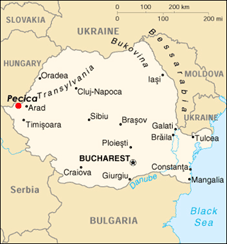Pecica : Romania

Area : 238.391 sq km (91,699 sq mi).
Population : 19.942.000 inhabitants.
Capital : Bucharest
Religion : Romanian Orthodox.
Economy :
- Industry: machinery, oil and natural gas, chemicals, metal products, food processing.
- Export crops: grapes, grains, wood, vegetable oil, meat.
The Communists took power in 1947 and installed a Soviet-style government. However under President Nicolae Ceausescu, Romania steered its own course, refusing to take part in the Warsaw Pact. The police arrested all the dissidents and monitored contacts with foreigners. A granary and an oil producer, Romania- so named because it was a colony of imperial Rome- is also a vacation spot because of the beaches of the Black Sea. But Romanians have enjoyed little of the bounty. To help repay bank loans, oil and agricultural produce were exported during the 1980s, while imports were restricted, electricity was rationed, and shop shelves lay bare. With a decline in production, basic commodities remain scarce and exports have slowed down. In 1989 the government security police killed demonstrators in Timisoara and Bucharest, starting a bloody revolution. The ensuing execution of Ceausescu and his wife ended their reign of repression, deprivation, and ethnic discrimination. The National Salvation Front has dominated since the revoltion, but lingering suspicions about its communist ties, as well as antigovernment demonstrations, strikes, inflation, and unemployment, have weakened the party.
Source : National Geographic
Woluwe-Saint-Pierre and Pecica :
At the beginning, nothing could possibly relate Woluwe-Saint-Pierre to the Romanian village of Pecica. However, with the operation “Villages roumains” which took place in 1989, some preferential connections were made between both municipalities. At that time our population, which had seen on television the fall of Ceausescu, felt very concerned about the Romanian people. Food, medecines and clothes were collected and sent by convoys to Romania. Our help didn’t stop there and soon an active twining had started between the population of both municipalities. Since then, many projects have been initiated. Different sendings with school materials, relationships between young people who came to Belgium and their host families. Moreover every year numerous scout camps are organized, either in Romania or in Belgium. A scouting movement was created on the spot during the first camp in Pecica.
Beyond those relations, we’ve achieved, with the collaboration of the local authorities, the improvement of some development projects for the city of Pecica.
For example there are several thermal springs and thanks to Pecica’s location near by the Hungarian bordes, it presents a great tourist interest. An exploitation project of these springs and a tourism, has been introduced in partnership with the rural Foundation of Romania.
The twinning gives the opportunity to the young people of both municipalitys to learn to know each other.
Woluwe-Saint-Pierre and Pecica help so in building the Europe of tomorrow.
